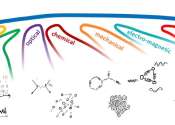Computer science (or computing science) is the study of the theoretical foundations of information and computation, and of practical techniques for their implementation and application in computer systems. It is frequently described as the systematic study of algorithmic processes that describe and transform information. According to Peter J. Denning, the fundamental question underlying computer science is, "What can be (efficiently) automated?" Computer science has many sub-fields; some, such as computer graphics, emphasize the computation of specific results, while others, such as computational complexity theory, study the properties of computational problems. Still others focus on the challenges in implementing computations. For example, programming language theory studies approaches to describing computations, while computer programming applies specific programming languages to solve specific computational problems, and human-computer interaction focuses on the challenges in making computers and computations useful, usable, and universally accessible to people.
The general public sometimes confuses computer science with vocational areas that deal with computers (such as information technology), or think that it relates to their own experience of computers, which typically involves activities such as gaming, web-browsing, and word-processing. However, the focus of computer science is more on understanding the properties of the programs used to implement software such as games and web-browsers, and using that understanding to create new programs or improve existing ones.









